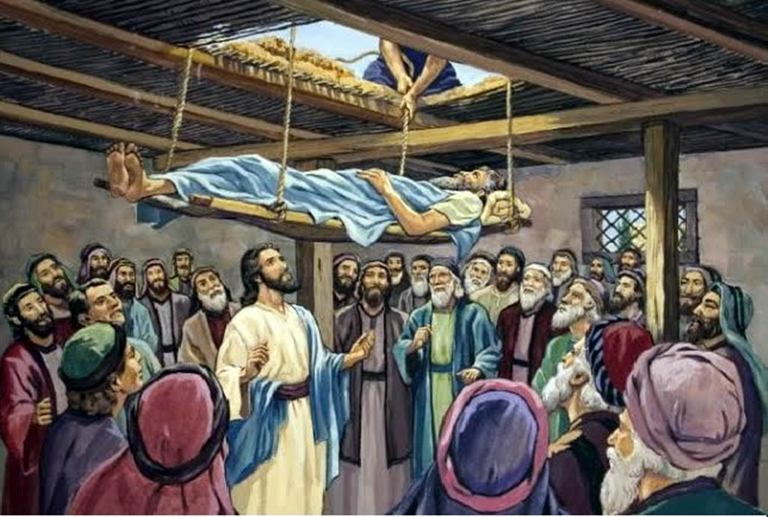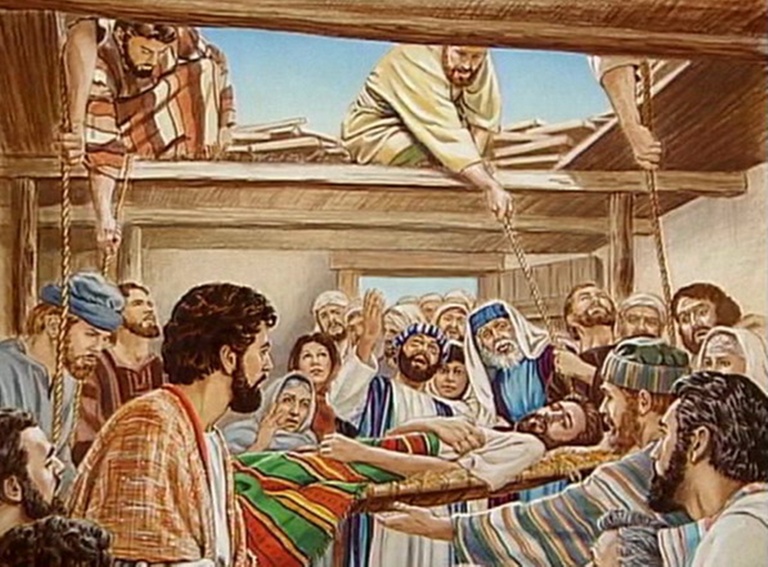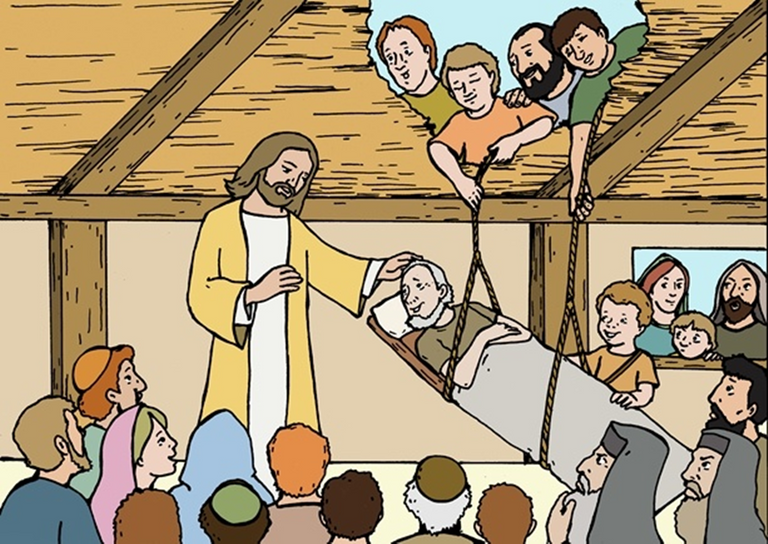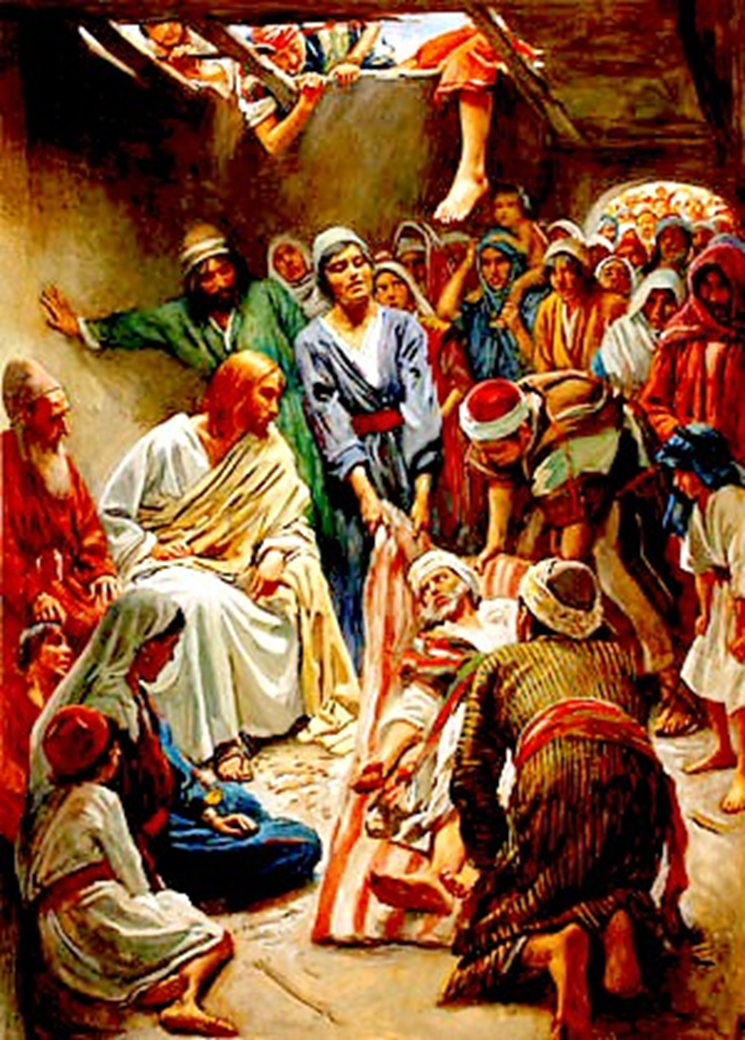[ESP] «Hijo, tus pecados te son perdonados» / [ENG] “Son, your sins are forgiven you”
[ESP] “Levántate, coge la camilla y echa a andar”
[ENG] “Get up, take the stretcher and start walking”

¿Qué es más fácil, decir al paralítico: “Tus pecados te son perdonados” o decir: “Levántate, coge la camilla y echa a andar”?
Pues, para que veáis que el Hijo del hombre tiene autoridad en la tierra para perdonar pecados -dice al paralítico-:
“Te digo: levántate, coge tu camilla y vete a tu casa”».
Se levantó, cogió inmediatamente la camilla y salió a la vista de todos.
Este acontecimiento dejó a todos los presentes asombrados, y no es para menos, cualquiera que vea un milagro de esa magnitud queda impactado; sin embargo, vemos que Jesús de Nazaret, por mas poder y autoridad que mostró ante la gente, por mas que expulsó demonios, curó enfermos e hizo milagros; además pasó haciendo el bien y demostró que era el hijo de Dios, el Mesías esperado, con todo y eso, lo crucificaron. Mi mamá decía: "Quien se mete a redentor muere crucificado"; Adagio con el cual se indica que todo aquel que obra bien y actúa a favor de los demás, a veces, saca la peor parte. Aquí y en muchos episodios vemos las obras maravillosas de Jesús y al final vemos toda la maldad que los envidiosos tejieron para atraparlo, martirizarlo y crucificarlo hasta verlo morir, lo que nunca se esperaron fue que resucitaría y Jesús de Nazaret ¡RESUCITÓ! y hoy esta vivo y alienta a los cristianos a vivir una vida de fe, santidad, amor, caridad, justicia y paz.
What is easier, to say to the paralytic: “Your sins are forgiven you” or to say: “Get up, pick up the stretcher and start walking”?
Well, so that you can see that the Son of man has authority on earth to forgive sins -he says to the paralytic-: "I tell you: get up, take your stretcher and go home"».
He got up, immediately took the stretcher and went out in full view of everyone.
This event left everyone present amazed, and it is not for less, anyone who sees a miracle of that magnitude is shocked; however, we see that Jesus of Nazareth, no matter how much power and authority he showed before the people, no matter how much he expelled demons, healed the sick and performed miracles; besides, he went about doing good and showed that he was the son of God, the expected Messiah, with everything and that, they crucified him. My mother used to say: "Whoever becomes a redeemer dies crucified"; Adage with which it is indicated that everyone who works well and acts in favor of others, sometimes gets the worst part. Here and in many episodes we see the wonderful works of Jesus and in the end we see all the evil that the envious wove to trap him, martyr him and crucify him until he saw him die, what they never expected was that he would rise again and Jesus of Nazareth RESURRECTED! and today it is alive and encourages Christians to live a life of faith, holiness, love, charity, justice and peace.

Y vinieron trayéndole un paralítico llevado entre cuatro y, como no podían presentárselo por el gentío, levantaron la techumbre encima de donde él estaba, abrieron un boquete y descolgaron la camilla donde yacía el paralítico.
And they came bringing him a paralytic carried by four and, since they couldn't present him to him because of the crowd, they raised the roof over where he was, opened a hole and lowered the stretcher where the paralytic was lying.

[ESP] Lectura del santo evangelio según san Marcos 2, 1-12
Cuando a los pocos días entró Jesús en Cafarnaún, se supo que estaba en casa.
Acudieron tantos que no quedaba sitio ni a la puerta. Y les proponía la palabra.
Y vinieron trayéndole un paralítico llevado entre cuatro y, como no podían presentárselo por el gentío, levantaron la techumbre encima de donde él estaba, abrieron un boquete y descolgaron la camilla donde yacía el paralítico. Viendo Jesús la fe que tenían, le dice al paralítico:
«Hijo, tus pecados te son perdonados».
Unos escribas, que estaban allí sentados, pensaban para sus adentros:
«¿Por qué habla éste así? Blasfema. ¿Quién puede perdonar pecados, sino sólo uno, Dios?».
Jesús se dio cuenta enseguida de lo que pensaban y les dijo:
«¿Por qué pensáis eso? ¿Qué es más fácil, decir al paralítico: “Tus pecados te son perdonados” o decir: “Levántate, coge la camilla y echa a andar”?
Pues, para que veáis que el Hijo del hombre tiene autoridad en la tierra para perdonar pecados -dice al paralítico-:
“Te digo: levántate, coge tu camilla y vete a tu casa”».
Se levantó, cogió inmediatamente la camilla y salió a la vista de todos. Se quedaron atónitos y daban gloria a Dios, diciendo:
«Nunca hemos visto una cosa igual».
Palabra del Señor
Gloria a ti Señor Jesús
[ENG] Reading of the holy gospel according to Saint Mark 2, 1-12
When Jesus entered Capernaum a few days later, it was known that he was at home.
So many came that there was no room even at the door. And he proposed the word to them.
And they came bringing him a paralytic carried among four and, as they could not present him to him because of the crowd, they raised the roof over where he was, opened a hole and lowered the stretcher where the paralytic was lying. Seeing their faith, Jesus tells the paralyzed man:
"Son, your sins are forgiven you."
Some scribes, who were sitting there, thought to themselves:
"Why does he talk like that? Blasphemous. Who can forgive sins, but only one, God?
Jesus immediately realized what they were thinking and said to them:
"Why do you think that? What is easier, to say to the paralytic: “Your sins are forgiven you” or to say: “Get up, pick up the stretcher and start walking”?
Well, so that you can see that the Son of man has authority on earth to forgive sins -he says to the paralytic-:
"I tell you: get up, take your stretcher and go home"».
He got up, immediately took the stretcher and went out in full view of everyone. They were astonished and gave glory to God, saying:
"We've never seen anything like it."
Lord's word
Glory to you Lord Jesus
